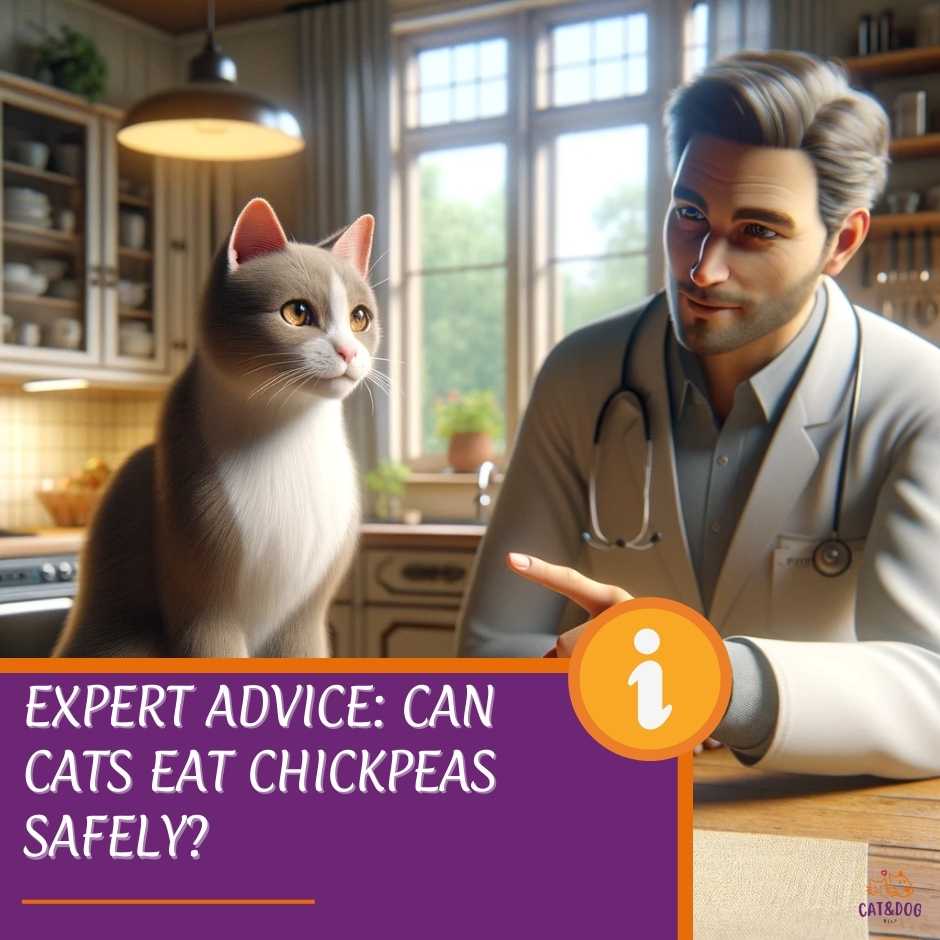With the curiosity of cats and the creativity of cat owners alike, it’s no surprise that questions about feeding chickpeas to feline friends pop up more frequently than a cat on catnip.
So, can cats eat chickpeas?
Chickpeas, or garbanzo beans, also known as the Egyptian pea, are a staple in many households, loved for their versatility and health benefits to humans. (1)
But when it comes to your cat’s diet, it’s not just about what’s healthy for you, but whether or not your feline friend will enjoy eating chickpeas, including falafel.
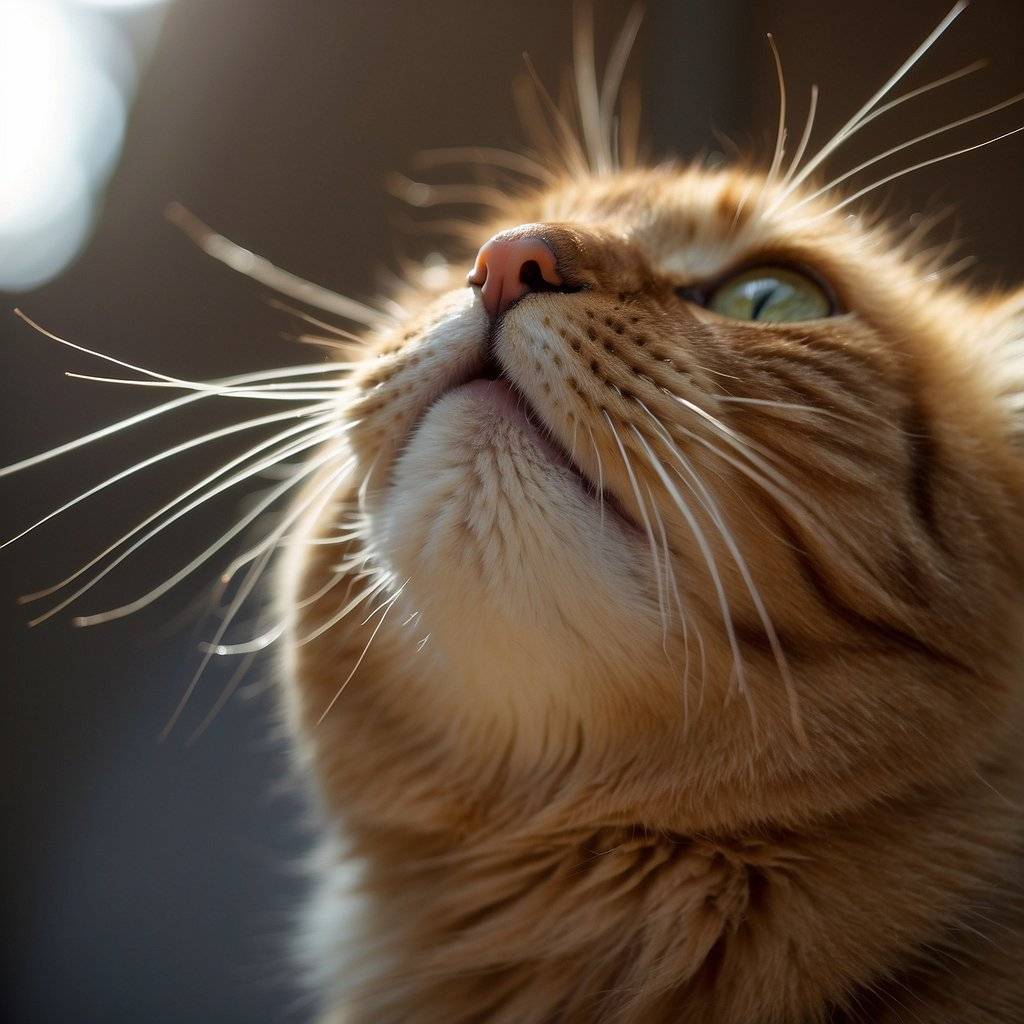
Understanding what’s on your cat’s menu is more than just a quirky interest; it’s a fundamental aspect of ensuring their well-being and happiness.
Cats have specific dietary requirements, including protein requirements, that differ greatly from our own, and while protein is a pivotal part of their diet, not all protein sources, such as cat food, are created equal when it comes to meeting your cat’s nutritional needs and their health. (2)
Key Takeaways
- Chickpeas are safe for cats in small amounts, but not necessary for their diet.
- Cats require a protein-rich diet, but the protein in chickpeas is not the ideal type for cats.
- Always consult with a veterinarian before introducing new foods like vegetables and fruits into your cat’s diet.
Nutritional Analysis of Chickpeas for Cats
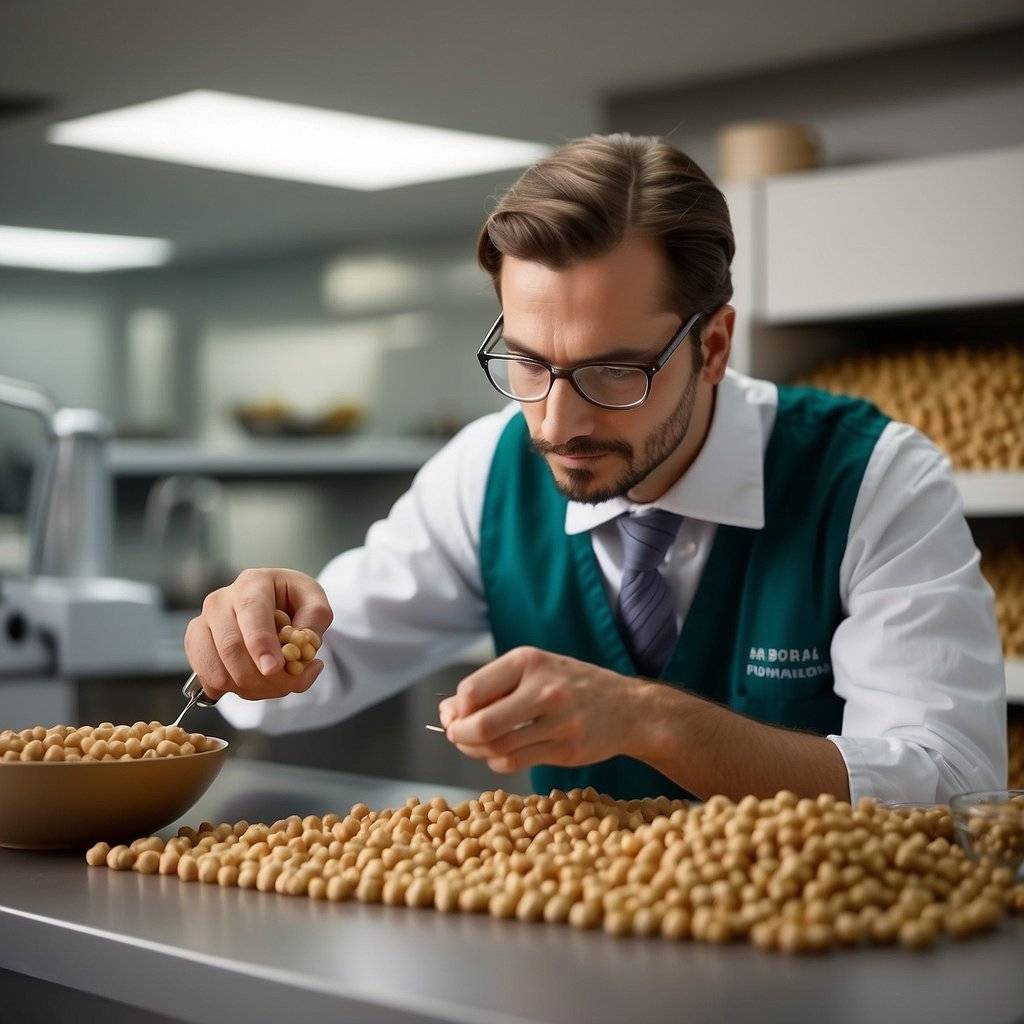
Hey there, cat owners! Ever wonder if those tiny chickpea morsels are goodies for your feline friend? Let’s crunch the numbers on chickpeas and see how they measure up in your cat’s diet.
Chickpeas, also known as garbanzo beans, are packed with nutrients, including potassium, magnesium, and folate, that might sound impressive to you, but the question is, do they purr-fectly fit into your cat’s dietary needs, especially if she has skin problems?
Key Nutrients in Chickpeas:
- Protein: A vital component for every cat’s muscle maintenance.
- Fiber: Great for us humans, but cats have a different digestive system.
- Vitamins: Chickpeas have B vitamins and folate, which sound healthy, right?
While chickpeas can provide a good amount of fiber which is beneficial for us, it’s important to tailor fiber for feline health specifically, ensuring it supports rather than disrupts their unique digestive systems.
But here’s the scoop: even though cats need protein, they require specific types that come from meat-based sources.
Chickpeas have plant-based protein, which is like giving them a puzzle with missing pieces—cats can’t utilize it effectively.
Comparison with Cat Dietary Needs:
Cats are obligate carnivores—they’re all about the meat. They thrive on a diet high in animal protein and have a limited ability to digest plant materials. (3)
- Protein: Cats say yes to animal protein for essential amino acids.
- Fiber: They don’t need as much fiber as we do, so keep it minimal.
- Vitamins: While B vitamins are beneficial, your cat would prefer them served in a mouse, not a mash.
Those chickpeas might not be the nutritional champions for your whiskered companion. Cats’ tummies and chickpeas?
It’s a bit of a mismatch. Keep those chickpeas to yourself, and let your cat stick to their carnivorous cravings. Remember, moderation is key—when in doubt, meat it out!
Pros and Cons of Feeding Chickpeas to Cats
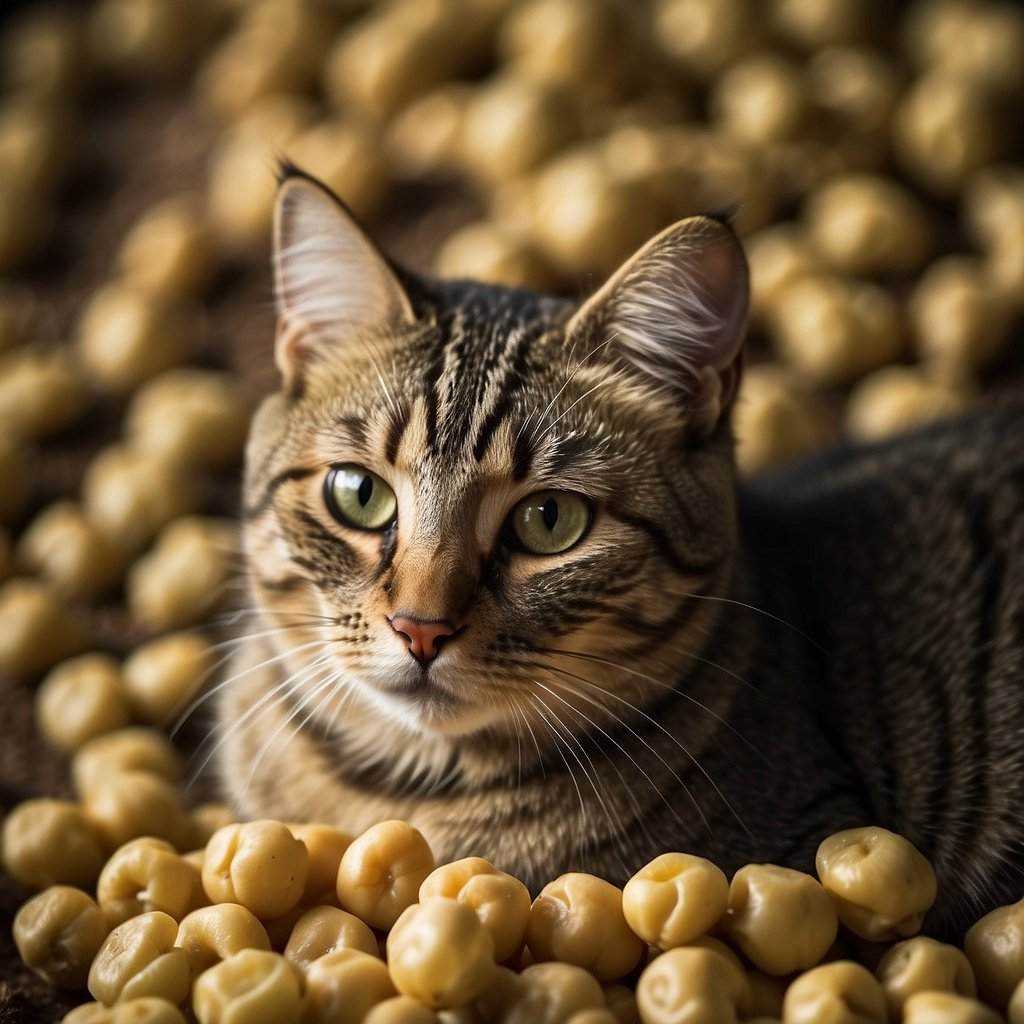
Have you ever wondered if those little round beans you love could be a snack for your feline friend? Let’s talk chickpeas and see if they’re a cat’s perfect treat.
Pros:
- Fiber Fix: Chickpeas boast a good amount of fiber which can help keep your cat’s digestive system running smoothly.
- Protein Power: They also contain protein, an essential nutrient for cats.
Risks:
- Gastro No-no: Some cats might experience an upset stomach because chickpeas aren’t a natural part of their diet.
- Allergy Alert: Just like humans, cats can be allergic to chickpeas, and introducing them could trigger an allergy.
| Benefits | Risks |
| Aids digestion | Can cause GI upset |
| Protein source | Potential allergen |
Remember, moderation is key! A chickpea or two might not harm your cat, but their diet should be mainly high-quality cat food.
So, while those fiber-full beans might seem like a great idea, your kitty’s tummy might vote against it. And let’s face it, an upset cat is something we all want to avoid, right?
Instead, you can consider feeding your cat spinach as a safe and healthy alternative to chickpeas.
Spinach, which should not be given to cats with urinary or kidney complaints, is a good source of vitamins for other cats. In particular, it contains vitamins A, K, B6, B3, B2, and C.
It also has minerals like potassium, calcium, and magnesium and has decent levels of fiber while being low in calories.
If you’re considering chickpeas as a snack, think about your cat’s current diet and any sensitivities they might have.
It’s always safest to consult with your vet before playing chef with your cat’s menu. After all, keeping your feline overlord happy and healthy is what it’s all about!
In the dance of diet and snacks, chickpeas might tap their way into the menu. Just keep an eye on your cat and make sure they’re enjoying the groove!
Real-World Cases and Anecdotal Evidence
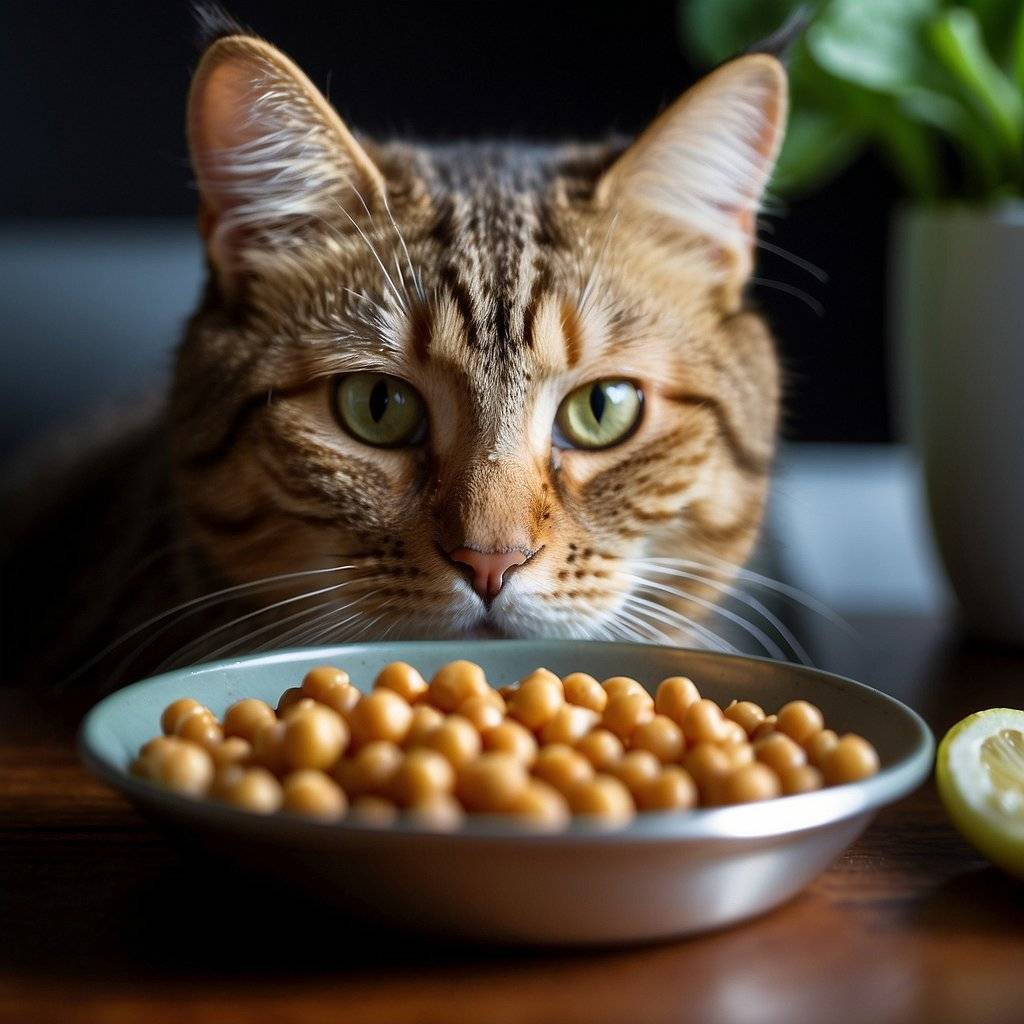
Have you ever wondered if those little round beans you love to add to your salad are okay to share with your furball? Let’s dive into some real-world experiences that pet parents like you have shared.
Case Study: Miss Whiskers and Chickpeas One cat owner reported that Miss Whiskers, their domestic shorthair, started having digestion issues, including diarrhea and constipation, after snacking on chickpeas. (4)
A vet visit revealed that while carbs aren’t toxic to cats, they aren’t necessary for their diet, and high-fiber beans like chickpeas could lead to tummy troubles, including constipation and diarrhea.
So, should you scrap the idea of sharing your hummus? Not necessarily. Some anecdotes tell a different tale.
| Anecdotal Positive Feedback | Anecdotal Concerns |
| Mild interest in chickpeas | Digestive issues post-consumption |
| Temporary playful behavior | Lack of nutritional need for beans in a cat’s diet |
| No adverse reactions in some cases | Variable appetite for chickpeas among different cats |
Are chickpeas the feline equivalent of catnip? Hardly. Your kitty might bat a stray chickpea around the kitchen floor but don’t expect them to go crazy for it.
It seems like cats’ responses to chickpeas can range from mild curiosity to complete indifference.
Remember, while kitties can handle the occasional chickpea, they’re meant to get their nutrients from meat. If you’re still tempted to treat your cat to something special, why not stick to a small piece of cooked chicken?
Curious if other cats have had similar chickpea capers? Ask around in your pet parent community or check out cat forums for stories of how these little legumes were received by other feline friends.
Just remember that each cat is unique and what works for one may not suit another. Keep an eye on your kitty’s reaction, and when in doubt, ask your vet!
Safe Chickpea Feeding Practices
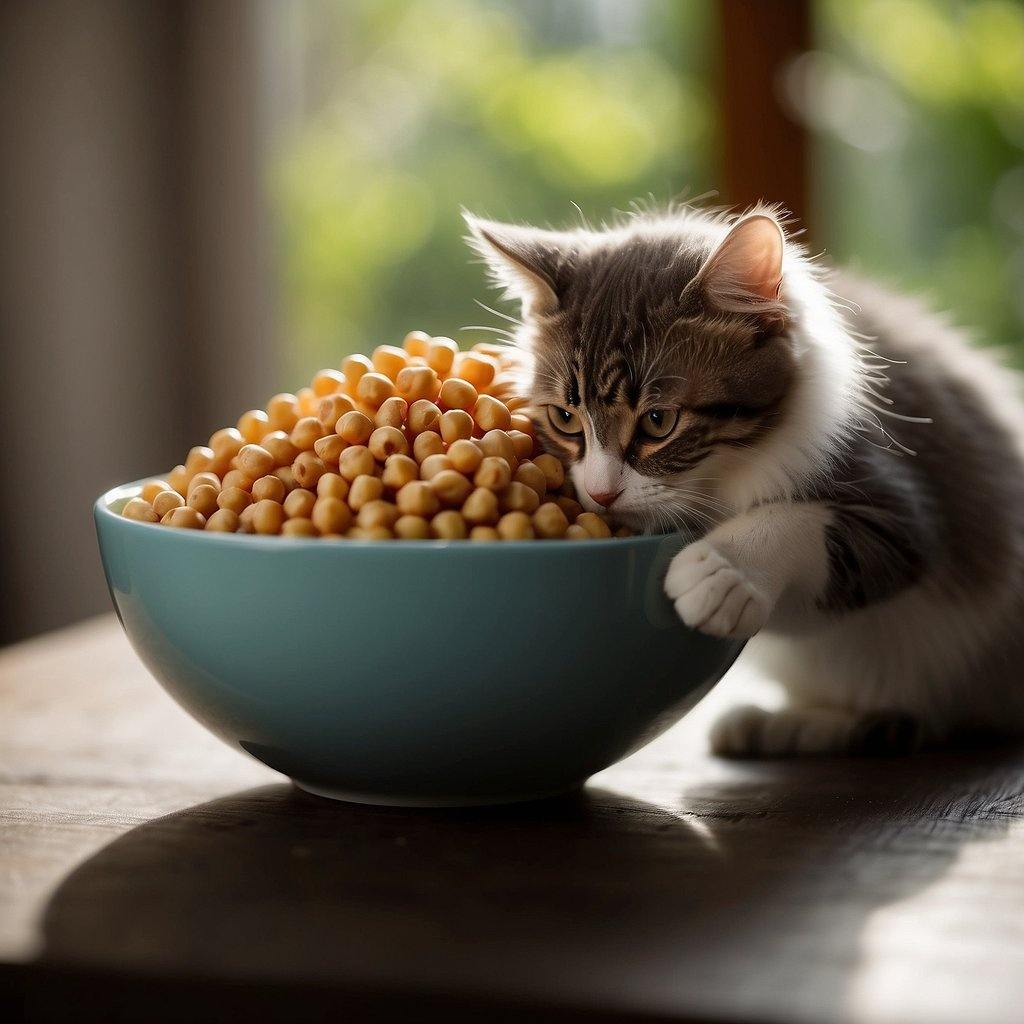
Hey there, cat lovers! Are you considering spicing up your furball’s menu with some chickpeas?
You’re in luck because these little legumes can be a healthy snack for your kitty—with a few caveats. Let’s break down how to serve them up safely!
Serving Guidelines
First things first: moderation is key. Cats are obligate carnivores, which means their diet should be mainly meat. Chickpeas can be a nice treat, but they’re no substitute for a steak—or a mouse! (5)
As a rule of thumb, chickpeas should only make a tiny portion of your cat’s diet, especially if you’re making stews out of lean meats and stews.
Think of them like the parsley garnish on a dish—there for a hint of flavor but not the main event.
It’s important to note that cats should avoid processed meats, such as hot dogs and deli meat, as these can contain harmful preservatives, additives, and additives that can be detrimental to a cat’s health.
- Quantity: A few chickpeas (think 3-5) once a week is plenty.
- Frequency: Treat your kitty to these legumes no more than once a week.
Preparation Advice
Now, how to prep these little guys? Imagine cooking for someone who can’t say “no onions, please!” Keep it simple.
- Cooking: Always cook chickpeas thoroughly. Raw chickpeas are a no-go for cats.
- Seasonings: Nope, nada. Salt and spices could harm your furry friend, so serve these beans plain.
- Serving: Ensure chickpeas are soft and cool to the touch.
Remember, the way to your cat’s heart is through consistency and safety, not culinary surprises. Keep chickpea servings sparse and spice-free, and as always, watch how your cat responds.
If they show any signs of indigestion or disinterest, it’s best to stick to their regular chow. Curious?
Give it a try, and let’s keep those whiskers twitching in delight – safely with squash and other alternatives to reduce hairballs in their various forms!
Healthier Alternatives to Chickpeas for Cats
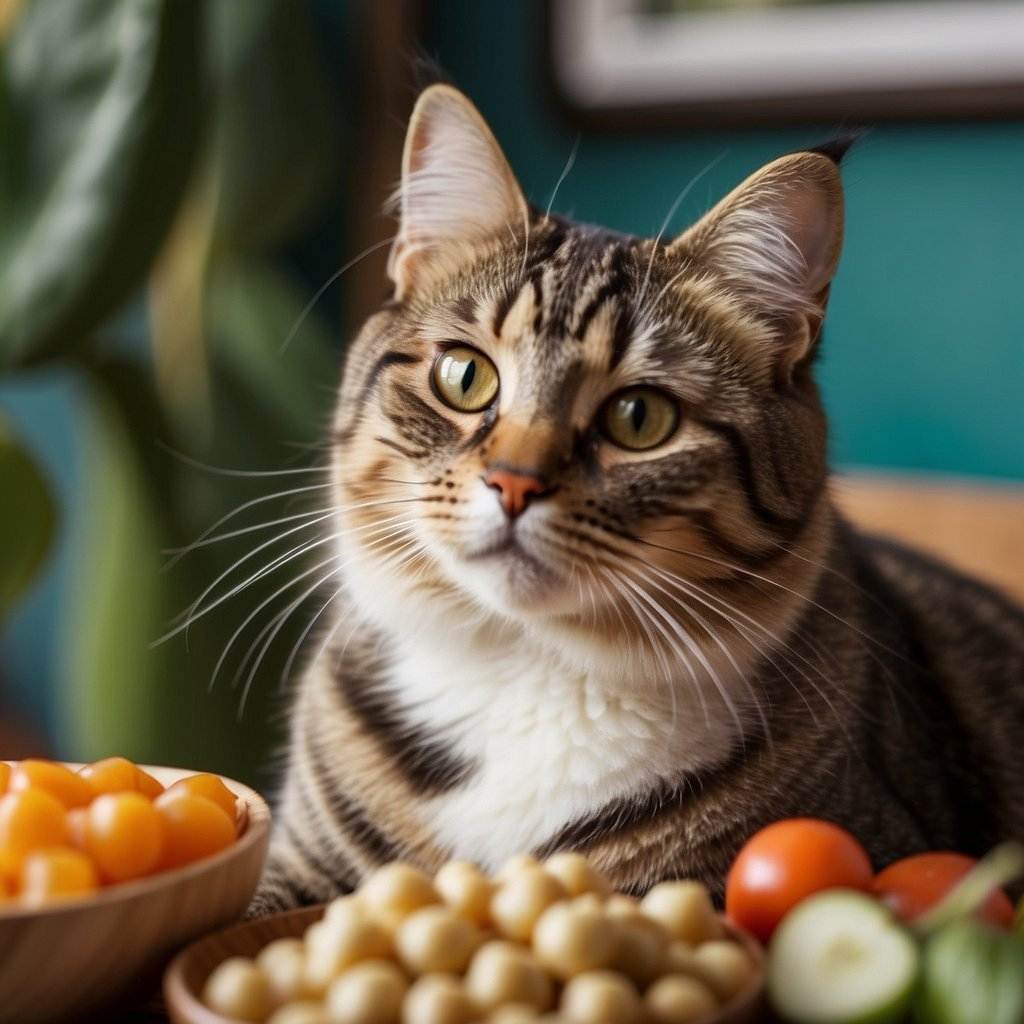
Hey there, fellow cat-lover! Wondering if there’s something better out there than chickpeas for your kitty? Let’s dig into some healthier and more suitable snacks for your feline friend.
Better Suited Treats: Feeling like a chef? Whip up some lean, cooked meats—chicken, turkey, or beef — as these are packed with the animal protein cats crave and are perfect for their carnivorous diet.
Stick to small portions, though; treats should only be a small part of their overall diet.
Commercial Cat Treats: Prefer something ready-made? Go for high-quality commercial cat treats that are formulated specifically for cats.
These are not only convenient but also nutritionally balanced, ensuring your cat gets the right amount of nutrients without the fillers often found in human food.
Nutritional Showdown: Chickpeas vs. Meats & Treats: (6)
| Nutrient | Chickpeas | Cooked Meats | Commercial Treats |
| Protein | Moderate | High | Varies |
| Essential Amino Acids | Lacking | Complete | Tailored for Cats |
| Fat | Low | Varies | Controlled |
| Carbohydrates | High | Low | Minimal |
Chickpeas do have their merits—they’re full of protein and fiber. But here’s the deal: Cats need specific amino acids like taurine, which chickpeas just don’t have enough of.
To ensure your pet’s health and happiness, focus on providing safe cat treats that align with their carnivorous dietary needs rather than experimenting with human foods like chickpeas.
Plus, cats can have a hard time digesting plant-based proteins.
So, next time you’re tempted to give Fluffy a bean, consider these alternatives instead.
They’re tailored for a cat’s diet and way more in line with what your kitty needs—meaty goodness and just the right vitamins and minerals. Keep those purrs coming with the right treats!
Expert Opinions and Veterinary Advice
Ever find yourself questioning if those chickpeas on your plate are safe for your feline friend to nibble on? Let’s see what the pros say!
Dr. Paola Cuevas, a veterinarian, emphasizes that information on feline diets should align with the latest research. While chickpeas are not toxic to cats, they’re not a necessary part of their diet either.
Your cat’s nutrition should be primarily protein-based, coming from meat, which is a great source of protein and much easier for them to digest than plant-based proteins.
However, some commercial cat food recipes include chickpeas as part of their ingredients to increase the protein content and overall nutritional value.
So, while chickpeas are not an ideal food for your cat, they are not poisonous and should not harm your cat when consumed in moderation.
Chickpeas can be a great source of protein for your cat, and you can give them as an occasional treat or add them to their regular meals if they seem hungry enough!
“Cats can eat chickpeas, but they don’t need to,” says Dr. Anthony M. Brooks, DVM. Cats are obligate carnivores, which means their bodies are made to process animal proteins.
While chickpeas do offer nutritional value, they aren’t the ideal choice for your kitty.
- Digestive Concerns: Dr. Harun, DVM advises against it due to potential digestive issues.
- Nutritional Mismatch: Cats lack certain enzymes to properly process legumes.
Research also suggests that while chickpeas are high in fiber, which isn’t harmful, it’s just not what your cat’s digestive system craves.
Instead, focus on a high-protein, meat-based diet that aligns much closer to their needs.
The chickpea conundrum might leave you scratching your head. Just remember: a treat is fine, a meal is not. Keep chickpeas as an occasional snack, and not a dietary staple.
Want to be on the safe side? Stick to cat food that’s specifically tailored to their carnivorous requirements. Happy feeding!
Quick Recap on Can Cats Eat Chickpeas
Hey there, cat lovers! Wondering about chickpeas and your furry friends? Let’s break it down:
Can cats eat chickpeas? Yes, they can. Chickpeas aren’t toxic to cats, and in theory, could offer a bit of variety in their diet. But here’s the catch: chickpeas are not a feline dietary staple and can be tough on their tummies.
Why might chickpeas be problematic for cats?
- Digestive Enzymes: Cats lack certain enzymes like alpha-galactosidase, making it harder to digest chickpeas properly.
- Nutrition Match: Chickpeas don’t provide the right nutritional profile that cats need from their diet. Cats are obligate carnivores relying mostly on meat.
If you decide to feed chickpeas, remember:
- Moderation is key! Too many chickpeas could lead to, well, an un-“purr”-pleasant bathroom situation for your kitty.
- Not a Protein Substitute: Chickpeas should never replace meat in your cat’s diet.
Curious about trying chickpeas for your cat? Speak to your vet first. Your cat’s health should always be the top priority, and understanding their unique dietary needs is essential for their well-being.
When in doubt, sticking to cat food that’s specially formulated for their dietary needs is often your safest bet.
It’s important to monitor your cat’s diet and watch for any signs of an allergic reaction, such as vomiting, diarrhea, or skin irritation. (7)
If you suspect that your cat has a food allergy, it’s best to consult with your veterinarian to determine the best course of action and avoid feeding them foods like chocolate, caffeine, garlic, onions, pickles and alcohol that are toxic to cats and can lead to various health problems, including vomiting, diarrhea, and even death in severe cases.
Stay informed, stay curious, and here’s to the health and happiness of your whiskered companion!
Frequently Asked Questions
Curious about whether your feline friend can enjoy chickpeas just like you do? Below are some direct answers to common questions that cat owners have about feeding chickpeas to their cats.
What are the risks of feeding my cat chickpeas?
Be cautious; chickpeas can be tough on your cat’s digestive system.
They’re not toxic, but they can cause discomfort like bloating or gas because cats lack the enzymes to break down legumes efficiently.
Can I safely include cooked chickpeas in my cat’s diet?
Occasionally cooked chickpeas in small amounts could be fine, but they shouldn’t be a staple. Your cat’s body is primarily designed to process meat, not plant-based proteins.
Are there any benefits to giving my cat chickpea flour in its meals?
Chickpea flour might offer minor nutritional benefits, but it’s not necessary for your cat’s diet. Cats need animal protein to thrive, so focus on meat-based options instead.
Can kittens eat chickpeas?
Kittens especially should avoid chickpeas.
Their young digestive systems are even more sensitive, and the emphasis should be on high-quality kitten food that promotes growth.
Is it better to give my cat cooked or raw chickpeas?
Cooked if at all, as raw chickpeas can be even harder to digest. But remember, cooked doesn’t equate to recommended.
How does the preparation of chickpeas affect their safety for cats?
Proper preparation, like cooking, can make chickpeas safer by softening them. However, this does not make them ideal for your cat’s dietary needs.
Are chickpeas a common allergen for cats?
Chickpeas aren’t a common allergen, but like us, each cat is an individual with unique sensitivities. If you suspect an allergy, consult your vet.

